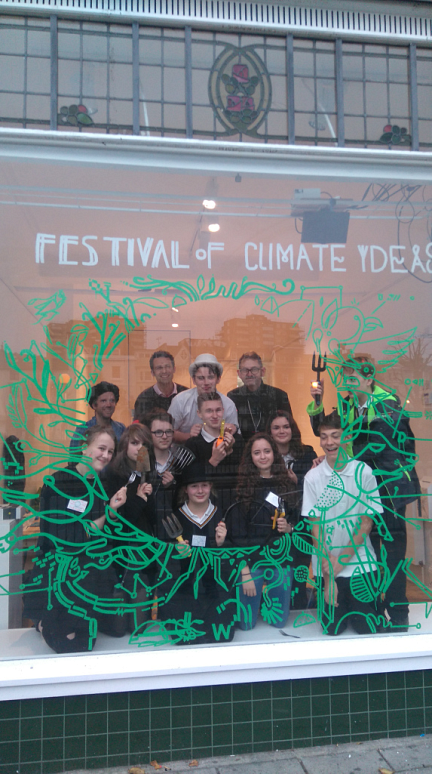Help
Community21 has selected some case study communities and projects to share across the network to inspire and inform others. Should we be featuring yours? If so get in touch.

FutureCoast Youth: Creative Collaborations for a Changing Climate
FutureCoast Youth is a collaborative partnership between University of Brighton Media Researchers, ONCA and Dorothy Stringer School which extends the project FutureCoast [http://futurecoast.org/] developed by US games designer, Ken Eklund: an online digital storytelling project which asks audiences to imagine and create voicemails from climatically changed futures.
FutureCoast Youth built on this participatory imaginative premise to bring climate change to young people in Brighton, through a series of workshops using play, storytelling, ideas of time and of how to relate climate change to the everyday.
The project culminated in a Young People's Climate Conference at ONCA, with students presenting their ideas in role as a conference delegation, to coincide with the UN Climate Convention (Paris, December 2015).
Project findings and impact
The project used different elements of play to engage the young people, including immersive fictional play and ‘play for play’s sake’. Immersive play and fiction was created through the students being addressed as the FutureCoast Youth team dedicated to addressing climate change. From the outset students were told the rules of play: that when they entered the workshop they were members of the FutureCoast Youth team and that for the following hour they would be focused solely on the issue of climate change; exploring their feelings and finding forms of positive action and solutions to this issue. This fictional narrative was also introduced to the students’ through an immersive play experience at the beginning of the project, hosted at ONCA gallery. Students were addressed as members (or FutureCoast Agents) of a fictitious network of groups dedicated to addressing climate change. Through this immersive play, the students were introduced to the concept of voicemails from the future, and then created their own voicemails.
The other element of play was the use of playful games in the workshops to build students confidence: some of this was ‘play for play’s sake’, and some was oriented towards play about climate change. The goal of the workshops was to help the students move towards producing their own creative work on climate change to be shared online and at the end of project through a Young People’s (Future) Climate Conference at ONCA.
Findings:
At the start of the project, many of the students believed in technological solutions to addressing climate change and invested power in governmental responsibility and action. They did not see themselves as part of a political system or having agency outside of this system.
By the end of the project the students views had changed in different ways: •All of the students expressed feelings of increased confidence – either related to gaining knowledge of climate change and solutions, or communicating about climate change to others. These findings were gendered – boys were generally more concerned with acquiring knowledge and techno-solutions and individual approaches, girls were more concerned with communicating, connectivity and spreading awareness. •Students’ feelings about climate change changed during the project, and were often gendered: some of the girls expressed a complex negotiation of competing emotions (both positive and negative); some of the boys were singular and assertive in their responses (both positively and negatively about climate change). •All expressed enjoyment of the playful aspect of the project, even those who were worried about presenting in front of others enjoyed it in the end, enabling self expression which could be linked to self efficacy.
Other findings – reflections from project leaders •The playful approach was incredibly powerful as a form of participation and engagement, leading to greater feelings of self-efficacy amongst the students. •Students engaged better outside the classroom than inside. The two immersive fictional play events at ONCA – at the beginning and end of the project – generated more interaction and engagement. •Trusted messengers - Teachers were key to gaining access to students and keeping the pupils on track. •The learners were young and lacked confidence. We were over-optimistic about the amount of ground we would cover in a short space of time. Many of them struggled to undertake the project homework, affecting time spent in sessions spent completing the homework rather than moving forward. •It takes time to gain young people’s trust and for them to take ‘risks’ – particularly when approaching the topic of climate change creatively, and in the context of a science lesson. •Students choosing their topic for a creative output represented a turning point in the project, leading to self-ownership and efficacy.
Impacts
Some of the students involved in the project have been inspired to work with ONCA on other climate change arts projects
Dorothy Stringer Tutors identified the rapid growth in group and individual confidence over the course of the project, enabling the GCSE group to form bonds quicker than in previous years.
FutureCoast immersive play public engagement event, 26 September 2015. 20 members of the public participated in the immersive play of FutureCoast, leading to a discussion about climate change engagement and the production of a number of voicemails from the future. http://arts.brighton.ac.uk/study/media-studies/events/futurecoast-brighton-public-launch
Participant responses to FutureCoast immersive play event:
"I am highly aware of climate change, but it was great to hear/see a new angle" (white female, 53.)
"Excellent. Humanises the idea of climate change" (male, 37)
"I really enjoyed the mixture of seriousness and fun…It makes you part of the process, involves you, as it is quite easy to think of climate change as other people’s problem" (white male, 53)
"It was very interesting and also made a serious subject humorous" (non specified, 36)
Contact Julie Doyle or Persephone Pearl for more information
[j.doyle@brighton.ac.uk] [Persephone@onca.org.uk]
Or visit the ONCA website or Future Coast Youth blog.
http://onca.org.uk/ongoingprojects/futurecoast/ https://futurecoastyouth.wordpress.com/